The Kraw Lecture Series in Silicon Valley is made possible by a generous gift from UC Santa Cruz alumnus George Kraw (Cowell ‘71, history and Russian literature) and Raphael Shannon Kraw. The lecture series features acclaimed UC Santa Cruz scientists and technologists who are grappling with some of the biggest questions of our time.
These talks are free and open to the public
Our Kraw Lecture Series is so fantastic, we want to bring it right to you via live streaming. If you aren’t able to join us in person the night of the event, you can now stream the lectures and join in the conversation via online comments.
Designing human AI-ecosystems for education, work, and community
March 13, 2024
5:30 p.m. - 7:00 p.m.
Location: 3175 Bowers Ave, Santa Clara, CA 95054
Join Professor David Lee as he delves into the art of designing ecosystems to help navigate the rapid currents of change. Discover how he has expanded student learning opportunities through hands-on projects, connecting education with real-world social innovation. Explore the role of AI in enhancing learning and collaboration alongside reflections on fostering more human-centered human-AI interactions.
Professor Lee doesn’t just speak from theory; he shares practical insights gained from growing the Tech4Good lab which involves over 120 undergraduate students each quarter. These students explore user research, UI/UX design, web development, and AI, all while making a tangible impact on hundreds within the community. Join us as Professor Lee paints a vision for reshaping education, work, and community engagement, all geared towards nurturing individuals’ true potential and contributions.
Our Speaker
David T. Lee is an assistant professor of computational media at UC Santa Cruz, where he directs the Tech4Good Lab. He received his Ph.D. from Stanford University and a B.S. from the California Institute of Technology. His research centers on designing human-AI ecosystems for education, work, and community engagement, and on supporting experiential, community-engaged passion-driven learning. He founded and directs several student programs including the Tech4Good Collaboratory, a Course-Based Community Consultancy, and the Exploratory Reading Group program, each of which provides rich learning experiences to hundreds of students as early as their first year. His work has received awards at AAAI HCOMP and ACM CHI, been published in the Proceedings of the National Academy of Sciences (PNAS), and has been deployed to serve students, communities, and governments. He has received a Baskin Engineering Teaching Excellence Award, NSF Graduate Research Fellowship, Accel Leadership Fellowship, Santa Cruz Titans of Tech Award, Brown Institute for Media Innovation Magic Grant (x2), Google Scholars Research Award, Public Interest Technology University Network (PIT-UN) Network Challenge, and NSF Improving Undergraduate STEM Education Grant (x2).
Registration information
Telomeres: How new technology shifts old paradigms
February 7, 2024
Telomeres, the protective caps on the ends of chromosomes, play a pivotal role in human disease and aging. It has been thought that short telomere lengths cause age-related degenerative disease, while long telomeres predispose people to cancer. Nobel Laureate Carol Greider will describe what we know about telomeres and how work by UC Santa Cruz researchers using technology invented on our campus is calling into question long-held models about how telomere length is regulated. Susan Carpenter, UCSC professor of molecular, cell, and developmental biology, will moderate.
Our Speaker
Carol Greider Nobel Laureate in Physiology and Medicine Distinguished Professor, Molecular, Cell, and Developmental Biology, UC Santa Cruz
Molecular biologist Carol Greider joined UC Santa Cruz in 2020. Greider discovered the enzyme telomerase in 1984 while she was a graduate student in Elizabeth Blackburn’s lab at UC Berkeley and went on to pioneer research on the structure of telomeres, the ends of the chromosomes. She was awarded the 2009 Nobel Prize for Physiology or Medicine, along with Blackburn and Jack W. Szostak, for their discovery that telomeres are protected from progressive shortening by the enzyme telomerase. Before joining UC Santa Cruz, she was a Bloomberg Distinguished Professor, Daniel Nathans Professor, and Director of Molecular Biology and Genetics at Johns Hopkins University, a position she held after nearly a decade at Cold Spring Harbor Laboratory. She received her bachelor’s degree from UC Santa Barbara in 1983 and her Ph.D. from UC Berkeley in 1988.
The UC Santa Cruz Kraw Lecture Series presents: Bridging the Gap Between Artificial Intelligence and Natural Intelligence
December 6, 2023
The brain is the perfect place to look for inspiration to develop more efficient neural networks. Indeed, the inner workings of our synapses and neurons offer a glimpse at what the future of deep learning might look like. Our brains are constantly adapting, our neurons processing all that we know, mistakes we’ve made, failed predictions—all working to anticipate what will happen next with incredible speed. Our brains are also amazingly efficient. Training large-scale neural networks can cost more than $10 million in energy expense, yet the human brain does remarkably well on a power budget of 20 watts.
We can apply the computational principles that underpin the brain, and use them to engineer more efficient systems that adapt to ever changing environments. There is an interplay between neural inspired algorithms, how they can be deployed on low-power microelectronics, and how the brain provides a blueprint for this process.
Our Speaker
Jason K. Eshraghian is an assistant professor with the Department of Electrical and Computer Engineering at UC Santa Cruz. He received Bachelor of Engineering (Electrical and Electronic) and Bachelor of Laws degrees from University of Western Australia, WA, Australia in 2016 where he also received a Ph.D. in 2019. From 2019 to 2022, he was a postdoctoral research fellow at the University of Michigan, MI,. He serves as the Secretary of the Neural Systems and Applications Technical Committee. He is the recipient of a Fulbright Fellowship (Australian-American Fulbright Commission), a Forrest Research Fellowship (Forrest Research Foundation), and the Endeavour Research Fellowship (Australian Government). His research interests include neuromorphic computing, spiking neural networks, and memory circuits, and he is the developer of snnTorch, a widely used Python library with over 100,000 downloads used to train and model spiking neural networks.
Habitable Exoplanets with Extremely Large Telescopes
June 16, 2022
Fifty-three years ago, 600 million people watched the Apollo 11 astronauts take the first human steps on another world. In 1969, the number of worlds worth walking on was small: just the few dozen planets and moons that make up the Earth’s siblings orbiting the Sun. Today, astronomers know that our galaxy is teeming with planets, more numerous than the stars themselves. However, detecting signs of life, or “biosignatures,” on another world requires separating the light of the planet from that of its sun and dispersing that planet’s light into a spectrum – a technique called “direct imaging and spectroscopy.” So far, only extremely young, massive worlds have been directly imaged, while older, smaller objects like the Earth remain hidden in the glare of their suns. In this talk, I will describe a variety of avenues for advancing the state-of-the-art in exoplanet imaging, taking advantage of diverse tools ranging from computer simulations, to laboratory demonstrations, to observations at the world’s largest telescopes.
How to Make a Star
May 18, 2022
We come from the stars. What if we could touch them? In this talk on building stars, telescopes, and communities, Dr. Nia Imara will present efforts to create the first 3D-printed stellar nurseries, with the aim of shedding light on the complex structure of star-forming environments; efforts to develop a new radio observatory and an astronomy program in Ghana; and new efforts underway to improve STEM education for youth from historically marginalized communities.
To eat or not to eat? How environmental chemicals contribute to obesity
April 5, 2022
Multigenerational disease research has shown links between some non-communicable diseases, their environmental origin, and lifestyle decisions our ancestors made. Defining those links will provide us with a better understanding of how our life choices can help preserve the health of our descendants. Raquel Chamorro-Garcia, assistant professor of microbiology and environmental toxicology, will talk about her research on how environmental pollutants can, through non-genetic mechanisms of action, lead to multigenerational metabolic disease.
Studying the Behavior and Physiology of Marine Megafauna in Nature
March 23, 2022
How do researchers study animals that spend their entire lives underwater and far from shore? Thanks to a variety of electronic sensors and data loggers, researchers are able to follow the behavior and physiology of marine megafauna while they are diving and migrating anywhere on the planet. The tracking technology has evolved considerably since the earliest attempts—from a capillary gauge that measure the diving behavior of birds and mammals—to sensors on electronic tags that transmit information on animals’ location, behavior, and physiology wherever they are in the world’s oceans. Over his career, Dan Costa has worked with some of the earliest time depth recorders that used photographic film from spy satellites to today’s most advanced electronic sensors. In this lecture, he will discuss the origins and evolution of “biologging” and the insights they provide into the amazing behavior and physiology of animals in nature. Check out this Kraw Lecture with our speaker Dan Costa and moderator Roxanne Beltran.
From Healthy Whales to Healthy Oceans
February 16, 2022
Whales are iconic ocean animals that hold special places in the hearts of many—and are a critical link in the structure of healthy marine ecosystems. Our research team has developed tools and novel approaches to studying the underwater lives of these ocean giants. New information on how much food whales consume allows us to calculate the amount of nutrients that they then recycle, promoting primary production and growth of vital components of the food web. This knowledge—when combined with information on where the critical foraging areas are for whales—provides the foundation for the development of marine protected areas that minimize the impacts of human activities.
What Seals Can Teach Us About Risk and Reward in the Open Ocean
January 19, 2022
Marine mammals undertake some of the most extraordinary migrations on the planet to eat and avoid being eaten. They make behavioral decisions based on the ecology of their prey and predators, all while keeping within the confines of their physiological limits. By attaching electronic instruments to seals, Assistant Professor Roxanne Beltran explores predator-prey interactions in the open ocean, and their implications for ocean health.
Planets and Stars with Keck Observatory and the James Webb Telescope
November 17, 2021
Virtual Lecture
We live in an era where thousands of exoplanets have been discovered by indirect methods. A much smaller number have been characterized directly, via imaging and spectroscopy. In this Kraw Lecture Andy Skemer associate professor of astronomy and astrophysics will explain how new technologies are allowing us to study individual exoplanets in detail. New instrumentation at University of California’s Keck Observatory and the impending launch of NASA’s James Webb Space Telescope will allow studies of the compositions, physical structures, and weather of planets orbiting other stars.
Microbes, Big Sur and Global Health
October 20, 2021
Virtual Lecture
Join us for an example of how curiosity-driven research can lead to practical global health solutions. Learn about a microbe known as Wolbachia that has invaded hundreds of thousands of insect species and manipulated their behavior, physiology, and reproduction and has caused diseases afflicting millions of people in impoverished regions of the world. In an interesting twist, this same microbe also provides a means of combating devastating insect-borne diseases that afflict over 1 in 6 individuals globally. Professor Will Sullivan will describe the work of his and many other labs in uncovering and harnessing Wolbachia’s fascinating biology and its symbiotic relationship with insect and worm host species.
3D imaging of living cells in real time
September 22, 2021
Virtual Lecture
Discovery in biology and medicine is strongly driven by new possibilities to visualize the processes of life. To see new things, the Saralab invents and custom builds new types of optical elements and imaging systems. Specific problems in Biology demand that we push technology to the limit in terms of both spatial and temporal resolution. In this Kraw Lecture learn how the SaraLab at UC Santa Cruz is harnessing the power of diffractive Fourier optics in microscopy enabling simultaneous 3D imaging that provides unique imaging compatible with several flavors of optical super-resolution.
Peering into the body—with less risk
August 18, 2021
Virtual Lecture
Most medical imaging devices—X-rays and CT scans, for example—use radiation to peer into the human body to produce images and other data that can help care providers arrive at a clinical diagnosis. But there are health risks associated with too much exposure to radiation, even in a clinical setting. Though researchers are developing new technologies and techniques to build low-radiation diagnostic tools, which are safer for both patients and clinicians, there remain major challenges associated with improving the quality and sensitivity of these tools. This lecture will address these challenges and provide an overview of new technologies—including some currently in development at the UC Santa Cruz Radiological Instrumentation Laboratory—as well novel data acquisition methods and artificial intelligence techniques that can be used to improve the quality of the images and data produced by low-radiation medical imaging devices.
Climate Controversies and Changepoints
June 16, 2021
Virtual Lecture
Join Professor and Chair of the Statistics Department Robert Lund for an introduction to the problem of changepoints in climatology and the hazards they induce. Changepoints, where measurements shift abruptly, are often caused by station relocations or instrumentation changes. Lund will discuss the methods data scientists use to detect and deal with changepoints in climate records. He will then use changepoint methods to explore a recent climate controversy about hurricanes and how they are likely to change as the climate gets warmer. Professor of Statistics and Vice Provost for Academic Affairs Herbert Lee will join us and moderate our conversation.
Bringing research into the clinic for children with cancer
May 19, 2021
Virtual Lecture
UCSC has made a vital, impactful leap into diagnostic testing with COVID-19. Now, we are on a path to leverage this work to bring a diagnostic genomics lab to UCSC. In this Kraw Lecture, we discuss how this diagnostic work at UCSC will impact the clinical environment. Dr. Sheri Spunt from Stanford will contribute by discussing the UCSC-Stanford partnership that is transforming the clinical experiences of children and their families, through the use of precision genomics. Professor Vaske and graduate student Yvonne Vasquez will discuss the genomics research behind diagnostics test development and implementation.
The past, present, and future of DNA-based forensics
April 22, 2021
Virtual Lecture
New technologies are being brought to bear in criminal justice. The existence of community databases of DNA information have enabled a new approach, forensic genetic genealogy, for identifying suspects in violent crimes. New technologies for recovering and analyzing DNA from forensic samples brings forensic genetic genealogy to bear for even previously intractable samples, like single rootless hairs. In conversation with Dean of Baskin School of Engineering Alex Wolf, Associate Professor Ed Green will present his approach and thoughts for where this may be headed.
Cultivating Leaders and Solutions for Coastal Sustainability
March 18, 2021
Virtual Lecture
Professor Anne Kapuscinski will speak about the new Coastal Science and Policy graduate program, which has attracted a highly diverse student body. She will also talk about her teams research on ecological aquaculture, applying circular economy principles to shift the worlds fastest growing food sector to sustainability. This graduate program and her research both pursue scalable solutions to benefit people and coasts from land to sea. Both also emphasize systems thinking, interdisciplinary approaches, and science-practice collaborations.
Forecasting the Future of a Changing Ocean
February 24, 2021
Virtual Lecture
Rising atmospheric carbon dioxide levels are already impacting the world’s oceans, and the US West Coast sits on the frontlines of the impending changes. From marine heat waves to ocean acidification, we are seeing profound changes. Professor Raphe Kudela and Associate Professor Kristy Kroeker will address how California’s coastal ecosystems, from marine fisheries impacted by harmful algal blooms to California’s iconic kelp forests, may change in the future.
COVID-19: vaccines, variants and more: Our latest understanding of the science of COVID-19, and the road ahead
February 16, 2021
Virtual Lecture
As vaccines for COVID-19 become more widely available, there are many questions. What’s in these vaccines? What differences can be seen in vaccines made by different manufacturers? How effective are these vaccines in fighting this disease? Are these vaccines protective against the new variants of the COVID-19 virus? As we look at the road ahead is there hope that we are nearing the end? Join our conversation with Marm Kilpatrick, professor, ecology and evolutionary biology as he returns to the Kraw lecture to help shed some light on these questions and others.
The Antarctic and Climate Change: Exploration Above and Below the Surface
January 27, 2021
Virtual Lecture
Please join us for our second Kraw lecture focused on climate change. Dan Costa, distinguished professor of ecology and evolutionary biology and director of the Institute of Marine Sciences at UC Santa Cruz, will share how the changing climate is associated with a reduction in true Antarctic species like Adélie and emperor penguins and crabeater seals, while subantarctic species like elephant seals and chinstrap penguins are becoming more common. Professor of Earth and Planetary Sciences Slawek Tulaczyk will share with us how the Antarctic glaciological community is evaluating how much and how fast the Antarctic ice sheet will shrink in response to climate change, particularly the Thwaites Glacier. Join us as we learn more about the UCSC glaciology research group, which is leading one of the large research projects aimed at understanding the current behavior and projecting the future evolution of Thwaites Glacier.
Telomeres: from curiosity driven research to human disease
December 8, 2020
Virtual Lecture
At this special Kraw Lecture Chancellor Cynthia Larive will welcome Carol W. Greider, Ph.D., recipient of the 2009 Nobel Laureate in Medicine, to our faculty and to UC Santa Cruz.
An eminent biologist and advocate for diversity in science, Professor Grieder shared the 2009 Nobel Prize in Physiology or Medicine for her pioneering work on telomeres and the discovery of telomerase.
Telomeres are structures made of repetitive DNA that protect the ends of chromosomes. Every time a cell divides, telomeres shorten by a small amount. This shortening is counterbalanced by the enzyme telomerase, which elongates telomeres by adding repetitive DNA to maintain an equilibrium in length. Increased telomere length enables the continuous proliferation of cancer cells, while telomere shortening is associated with aging and age-related diseases. Inherited telomere syndromes involving abnormally short telomeres can lead to bone marrow failure, lung disease, liver disease, and other conditions. Join us for this important talk with Professor Greider as she helps us understand telomere maintenance mechanisms at a fundamental level, and how it may allow new approaches to these diseases.
Preparing for Future Climate Change: Lessons from the Past
November 18, 2020
Virtual Lecture
What can 66 million years of climate variation data tell us about our future? Leading climate scientist and professor James Zachos explains how evidence of global warming in the fossil record is helping us to understand how our planet responds to massive C02 release events. We invite you to join us for this conversation about climate change moderated by Distinguished Professor of Ocean Sciences Christina Ravelo.
Hunting for infection, one molecule at a time
October 22, 2020
Virtual Lecture
Our COVD-19 response series continues, this time with a look at hardware solutions. Healthcare professionals need to be able to get diagnoses quickly, rather than sending samples offsite to be processed and waiting for the results. Professor Holger Schmidt’s lab is developing technology that could give doctors compact instruments that can deliver test results quickly and onsite. This optofluidic technology, invented in his lab, uses small silicon chips to guide light to either optically excite individual molecules or collect them for electrical detection with a nanopore. This allows physicians to assess if an infection is present, and how strong it is. These “labs-on-a-chip” detect viral RNA, antigens or antibodies, and count the molecules one by one, creating great promise for rapid, low-cost, and accurate testing for coronaviruses and other diseases. This is another example of the advances and promise of the research on integrated devices and nanopores taking place at UC Santa Cruz.
COVID-19: Tracing the evolution of the virus genome
September 24, 2020
Virtual Lecture
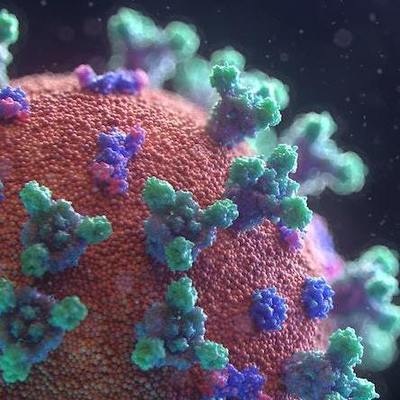 David Haussler, Distinguished Professor of Biomolecular Engineering discusses the role of the open source SARS-CoV-2 genome browser in tracing the evolution of the COVID-19 virus with Assistant Professor of Biomolecular Engineering Russ Corbett-Detig and Postdoctoral Researcher Jason Fernandes. Join the conversation to learn how this work impacts each of us.
David Haussler, Distinguished Professor of Biomolecular Engineering discusses the role of the open source SARS-CoV-2 genome browser in tracing the evolution of the COVID-19 virus with Assistant Professor of Biomolecular Engineering Russ Corbett-Detig and Postdoctoral Researcher Jason Fernandes. Join the conversation to learn how this work impacts each of us.
Hunting for infection, one molecule at a time
August 27, 2020
Virtual Lecture
Our COVD-19 response series continues, this time with a look at hardware solutions. Healthcare professionals need to be able to get diagnoses quickly, rather than sending samples offsite to be processed and waiting for the results. Professor Holger Schmidt’s lab is developing technology that could give doctors compact instruments that can deliver test results quickly and onsite. This optofluidic technology, invented in his lab, uses small silicon chips to guide light to either optically excite individual molecules or collect them for electrical detection with a nanopore. This allows physicians to assess if an infection is present, and how strong it is. These “labs-on-a-chip” detect viral RNA, antigens or antibodies, and count the molecules one by one, creating great promise for rapid, low-cost, and accurate testing for coronaviruses and other diseases. This is another example of the advances and promise of the research on integrated devices and nanopores taking place at UC Santa Cruz.
Speakers
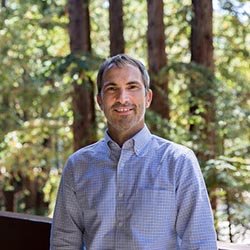 Holger Schmidt is the Narinder Singh Kapany Chair of Optoelectronics and a professor of electrical and computer engineering at UC Santa Cruz. He also serves as associate dean for research for the Baskin School of Engineering and director of the W.M. Keck Center for Nanoscale Optofluidics. His research interests include single molecule detection and analysis in optofluidic devices, hollow-core waveguide photonics, atomic spectroscopy on a chip, nano-magneto-optics, and spintronics.
Schmidt’s awards include NSF Career Award (2002), Keck Futures Nanotechnology Award (2005), and the Engineering Achievement Award from the IEEE Photonics Society (2017). He is a fellow of the Optical Society of America (2014), IEEE (2017), and the National Academy of Inventors (2019).
Holger Schmidt is the Narinder Singh Kapany Chair of Optoelectronics and a professor of electrical and computer engineering at UC Santa Cruz. He also serves as associate dean for research for the Baskin School of Engineering and director of the W.M. Keck Center for Nanoscale Optofluidics. His research interests include single molecule detection and analysis in optofluidic devices, hollow-core waveguide photonics, atomic spectroscopy on a chip, nano-magneto-optics, and spintronics.
Schmidt’s awards include NSF Career Award (2002), Keck Futures Nanotechnology Award (2005), and the Engineering Achievement Award from the IEEE Photonics Society (2017). He is a fellow of the Optical Society of America (2014), IEEE (2017), and the National Academy of Inventors (2019).
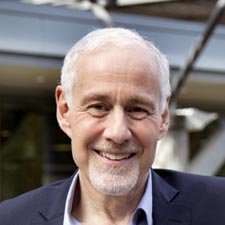 Alexander Wolf serves as dean of the Baskin School of Engineering and is a distinguished professor in the Department of Computer Science and Engineering at UC Santa Cruz. Professor Wolf received M.S. and Ph.D. degrees from the Department of Computer Science at the University of Massachusetts, Amherst, before joining AT&T Bell Laboratories in Murray Hill, New Jersey.
He was a professor at the University of Colorado, Boulder, University of Lugano, Switzerland, and Imperial College London, UK. Professor Wolf’s research interests span the areas of distributed systems, networking, and software engineering. He is a fellow of the Association for Computing Machinery, IEEE, and British Computer Society, and a member of the Computer Research Association board of directors and the American Association for Engineering Education public policy committee.
Alexander Wolf serves as dean of the Baskin School of Engineering and is a distinguished professor in the Department of Computer Science and Engineering at UC Santa Cruz. Professor Wolf received M.S. and Ph.D. degrees from the Department of Computer Science at the University of Massachusetts, Amherst, before joining AT&T Bell Laboratories in Murray Hill, New Jersey.
He was a professor at the University of Colorado, Boulder, University of Lugano, Switzerland, and Imperial College London, UK. Professor Wolf’s research interests span the areas of distributed systems, networking, and software engineering. He is a fellow of the Association for Computing Machinery, IEEE, and British Computer Society, and a member of the Computer Research Association board of directors and the American Association for Engineering Education public policy committee.
Jul 23, 2020
Virtual Lecture
COVID-19 Diagnostic Testing
The UCSC Molecular Diagnostic Lab, led by Jeremy Sanford, Olena Vaska, and Michael Stone, performs coronavirus tests for the UCSC Student Health Center and other medical providers in the Santa Cruz community. The lab’s rapid turnaround time is essential to patients and the community in order to combat the spread of COVID-19. A significant increase in testing capacity is considered essential to ensure public health and safety now that there is a loosening of the “shelter in place” orders.

Jun 30, 2020
Virtual Lecture
Marm Kilpatrick, COVID-19
Marm Kilpatrick will give a broad overview of the vast scientific literature on COVID-19 including mechanisms of transmission; high and low risk activities; fatality, including impacts on different ages and people with pre-existing conditions; challenges in understanding current levels of transmission & what this means for relaxing lockdowns; and how to interpret models & projections. He will highlight what he thinks are the biggest remaining questions and why they are difficult to answer. He will also, outline what almost all epidemiologists have outlined as the best strategy moving forward that allows us to both prevent widespread transmission and disease and also allow significant economic activity, and why we didn’t implement this 3 months ago and what still hinders us now.

Apr 28, 2020
Virtual Lecture
Rebecca DuBois, Viruses & Vaccines
Professor Rebecca DuBois studies how viruses cause infections and identifies weaknesses that can be targeted with vaccines and antiviral therapies. All human viruses must be able to attach to their target cell and transfer their genetic material inside the cell. The virus surface proteins that carry out these entry steps are the same proteins that our immune system can recognize and inactivate. DuBois and her team use an integrated toolkit of structural biology, biochemistry, virology, and immunology to investigate this molecular warfare between humans and viruses. This research provides a foundation for the development of next-generation vaccines.
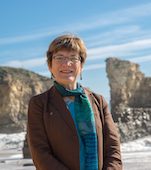
Mar 19, 2020
Postponed
Anne Kapuscinski, Cultivating Leaders and Solutions for Coastal Sustainability
Professor Kapuscinski will speak about the new Coastal Science and Policy graduate program which has attracted a highly diverse student body. She will also talk about her team’s research on ecological aquaculture, applying circular economy principles to shift the world’s fastest growing food sector to sustainability. This graduate program and her research both pursue scalable solutions to benefit people and coasts from land to sea. Both also emphasize systems thinking, interdisciplinary approaches, and science-practice collaborations.
UC Santa Cruz Silicon Valley Campus
3175 Bowers Avenue, Santa Clara

Feb 25, 2020
Astrobiologist Natalie Batalha
Natalie Batalha made Time magazine’s list of the 100 most influential people on Earth. She has discovered approximately 4,000 new planets—some of which may turn out to be capable of supporting life. She was recently elected to the American Academy of Arts & Sciences.

Oct 28, 2019
Adam Millard-Ball
Mean Streets—Self-driving Car Gridlock?
Self-driving cars are poised to create the largest upheaval in transportation planning since the arrival of the automobile. Join the conversation on October 28.
Self-driving cars are coming to your neighborhood, and your commute, but what are the downsides to this intersection of technology and human behavior? Adam Millard-Ball is at the forefront of efforts to identify problems before they hit our streets. His latest research reveals that autonomous vehicles will snarl inner-city traffic by “cruising” to avoid paying hefty fees to park. Previous work suggests that these risk-averse vehicles will create a pedestrian utopia that will slow urban traffic to a crawl.
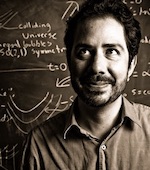
Jun 18, 2019
Anthony Aguirre
Where Did it All Come From, and Where is it All Going?
he physical universe, Aguirre will argue, is made of matter (or energy) and of order (or information). Aguirre will trace the 13.8 billion year history of this matter/energy told by modern cosmology, as it has developed into ever-more sophisticated order and structure: galaxies and their arrangement, stars, planets, life, and very recently and locally, civilization. The survival of civilization—and life itself—through the coming century is not assured, but if it continues, what could its future look like over thousands or millions of years? No one knows, but touring topics from fundamental physics to the nature of intelligence, Aguirre will lay out some of the possibilities.
We are delighted to announce the addition of an open house for our SVLink Incubator–Accelerator to our June 18 Kraw Lecture. SVLink serves nearly 20 UC and UC Santa Cruz-affiliated early stage startups at our Silicon Valley campus. There, they receive mentorship and entrepreneurial support in developing proof-of-product, identifying addressable markets, and engaging potential customers and angel investors. SVLink is just that—a link between the innovative UC Santa Cruz research and the market engine of Silicon Valley. Join us from 4:30–7 p.m. to meet our entrepreneurs and learn about their exciting new businesses. Then stick around for the Kraw Lecture.
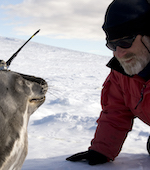
Apr 16, 2019
Daniel Costa & Caroline Casey
From the Beach to the Sea: How Technology Enables Us to Understand Marine Mammals
Daniel Costa, a pioneer in the development and use of electronic tags, will discuss how advances in technology that allow precise tracking of marine mammals’ movement leads to better understanding of their behavior and their response to climate impacts on habitats. Ph.D. candidate Caroline Casey studies the evolution of communication between male northern elephant seals. Vocalizations, which are used to drive off would-be rivals, have changed over generations from geographic dialects to individualized and more complex calls.
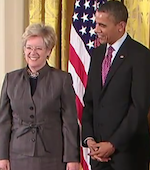
Mar 19, 2019
Sandra Faber
Cosmic Knowledge and the Future of the Human Race
Modern astronomy is telling us the story of our cosmic origins—how the Galaxy was assembled, how the Sun and Earth were formed, and where the chemical elements came from that comprise our bodies. We can now use this knowledge of our cosmic past to predict our cosmic future, and it looks bright ahead. We humans have been given the most precious gift of all, cosmic time—nearly a billion years of it. The challenge is clear: what will we do with it? National Medal of Science winner Sandra Faber will describe how the profound insights of cosmology are shaping the new Earth Futures Institute at UC Santa Cruz, which is grappling with this cardinal question.
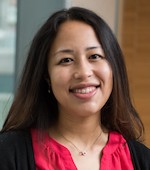
Feb 20, 2019
Angela Brooks
New Approaches to Treating Cancer Through RNA Analysis
Angela Brooks, an expert in the analysis of RNA sequencing data, is studying the role of RNA splicing aberrations in cancer. RNA splicing is an editing process that enables one gene to produce several different protein molecules. Mutations in the genes that regulate splicing are common in cancer cells. To investigate the effects of these mutations, Brooks and her team are developing the experimental and computational tools needed to directly assess the RNA output of cancer cells and understand how changes in RNA processing affect cell function. This research could lead to novel approaches for treating cancer and other diseases in which splicing is abnormal.
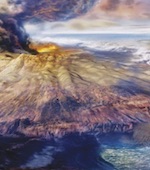
Jan 23, 2019
David Deamer
Assembling Life: How Can Life Begin on Earth and Other Habitable Planets?
Our knowledge of how life on Earth began is incomplete. While some pieces of the puzzle are firmly established by the laws of chemistry and physics, there is still conjecture about what the Earth was like four billion years ago, based on reasonable extrapolations from observing today’s Earth. David Deamer’s research tests the hypothesis that hydrothermal fresh water pools associated with volcanic land masses are a plausible site for life to begin. Deamer will discuss how conditions in volcanic regions like Kamchatka, Iceland and Hawaii could yield clues about the origin of life in a fresh water environment—and implications for the search for life on Mars and icy moons like Enceladus and Europa.
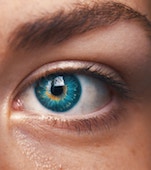
Dec 5, 2018
Roberto Manduchi and Jared Duval
Universal Access & Serious Games—Technology, Disability, and Social Good
Universal access is the goal of assistive technology, which seeks to enable everyone, disabled or not, to communicate and participate in society. By beginning with an understanding of the physiology, psychology, and sociology of disability, UC Santa Cruz researchers are developing technological solutions that are accessible, practical, and human-centered.
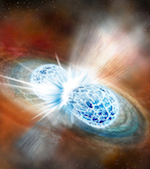
Oct 9, 2018
Ryan Foley
Shining Light on Gravity: Sometimes All that Shimmers IS Gold
In 1916, Albert Einstein predicted the existence of gravitational waves, a radiant form of energy similar to light, but caused by gravity. On August 17, 2017, a new kind of gravitational wave source was detected—two colliding neutron stars. Professor Ryan Foley will tell the harrowing David vs. Goliath story of how his small team of young, diverse scientists using a tiny telescope beat bigger teams with larger telescopes to make this incredible discovery.
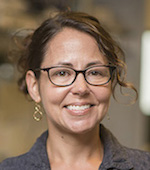
Sept 20, 2018
Beth Shapiro
Bugs, Bones, and Ancient DNA
A leader in the field of ancient DNA, Shapiro uses genetic material recovered from the remains of plants and animals that lived long ago to study evolution and explore how species and ecosystems have changed over time. She isolated the oldest DNA yet recovered—from a 700,000-year-old horse bone—as well as the oldest viral DNA and RNA. By “sequencing the dead,” we gain an understanding of how species, populations, and ecosystems changed, leading to better decisions about how to use limited resources to preserve and protect species and ecosystems in the face of current climate change.
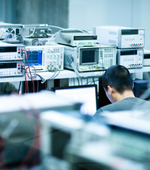
Jun 19, 2018
Data Security, Data Privacy, and You
How UC Santa Cruz is Influencing Information Security for Companies and Consumers
Our digital data—how it is kept safe, and who has access to it—is a topic of shared concern these days. From the latest security breach alert, to targeted Facebook ads, to the privacy updates flooding our inboxes, we’re inundated with news about our data security and privacy. Our panelists, including Aleatha Parker-Wood (Ph.D. ‘14) of Symantec, Assistant Professor Abhradeep Guha Thakurta—and recently added, Assistant Professor Benedict Paten, and graduate student James Hughes—will help us break down the issues and discuss what’s on the horizon in a conversation moderated by Alexander Wolf, Dean of the Baskin School of Engineering at UC Santa Cruz.
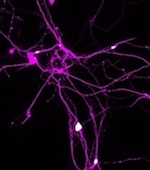
Apr 3, 2018
Daniel Kim, Camilla Forsberg, and Lindsay Hinck
Stem Cells–Friends or Foes? How Stem Cell Research Informs the Origins of Cancer
Researchers at UC Santa Cruz are harnessing the power of stem cells to understand the molecular underpinnings of diseases such as cancer, ALS, autoimmune diseases, and anemia. While stem cells’ ability to regenerate tissues holds promise for breakthroughs, stem cell therapies also carry a risk of causing cancer. Join us for a discussion of how to balance the promise with the risk and a glimpse of what stem cell research offers the future.
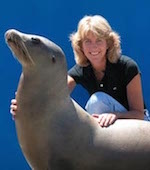
Feb 27, 2018
Terrie Williams
The Untamed Brain: Lessons in Human Cognitive Health from an Unexpected Teacher—Wild Whales
Despite remarkable advances in medical technology, we are only beginning to understand how our brain works. By moving from clinical settings and traditional animal models and into the wild, Williams’ lab is exploring how the mammalian brain is able to function flawlessly during variable stress and exercise levels, as well as during exposure to extreme environments. How diving dolphins and narwhals of the high Arctic avoid cerebral injury is changing our view of brain neuro-protection, and offering unique clues about preserving human cognition following stroke and concussive injuries, and indicating a potential neural basis for mass strandings by whales.

Jan 31, 2018
Hosted by Dean Alexander Wolf, Baskin School of Engineering and Assistant Vice Chancellor Mohamed Abousalem, Industry Alliances & Technology
Commercialization: Innovators
From research to patents and products: UC Santa Cruz faculty and students are an innovation powerhouse. Their inventions and research breakthroughs deliver social and economic benefits to our local—and global—communities. On January 31, we will hear from three professors whose research is driving real-world innovation in early-stage startups:
- Holger Schmidt, Professor of Electrical Engineering, Narinder Singh Kapany Chair of Optoelectronics and the Associate Dean for Research, Baskin School of Engineering
- Nader Pourmand, Professor of Biomolecular Engineering
- Richard E. Green, Assistant Professor of Biomolecular Engineering, Co-director of the Paleogenomics lab
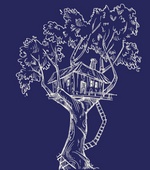
Dec 5, 2017
UC Santa Cruz Treehouse Cancer Initiative
Making Precision Medicine Personal for Kids: How Researchers and Doctors are Giving New Hope to Kids with Cancer Using Big Data Genomics
There are several truisms about childhood cancer: it tends to be aggressive, differs from adult cancers, and when treatments fail, time runs out quickly. Precision medicine powered by big data becomes personal when university researchers and doctors team up. The Treehouse Cancer Initiative at UC Santa Cruz uses comparative cancer genomic analysis to help doctors treat kids with few options. Learn more about how a new project partnering our Treehouse researchers with Stanford doctors is bringing new hope to families.
Featuring members of the UC Santa Cruz Treehouse Cancer Initiative:
- Olena Morozova, co-founder
- David Haussler, co-founder
- Isabel Bjork, director
- Lauren Sanders, Ph.D. student
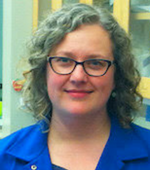
Nov 1, 2017
Carrie Partch
Circadian Rhythms: When Our Biological Clocks Go Bad…
Carrie Partch joined the UC Santa Cruz faculty in 2011. In her lab, Partch recently identified a gene that suppresses circadian rhythms in cancer, allowing tumor cells to escape daily controls on cellular growth. Now her lab is developing new therapeutic strategies that leverage circadian control over physiology to improve human health. She just received the 2018 Margaret Oakley Dayhoff Award from the Biophysical Society for her ground-breaking combination of biophysics and cell biology.
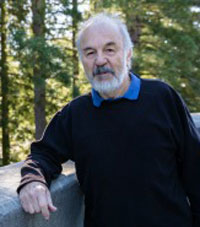
Jun 22, 2017
Exploring Biology’s Dark Matter: RNA
Recognizing Harry Noller, winner of the 2017 Breakthrough Prize
Noller, professor emeritus of molecular, cell, and developmental biology, recently received the 2017 Breakthrough Prize in Life Sciences for his discoveries about ribosomes, the tiny structures of the cell that Noller calls the “mothership of life.” His insights are taking us right to the brink of understanding the very origins of life on the planet.
From his unexpected discovery of the role RNA plays in the functioning of the ribosome has grown the world’s premier center for RNA research. The 16 research labs that comprise the UC Santa Cruz Center of Molecular Biology of RNA are forging new discoveries in the treatment of diseases like rheumatoid arthritis and cancer and developing new technological tools to advance the sciences.
Noller will be joined on stage by three Center researchers, Jeremy Sanford, Susan Carpenter, and Daniel Kim, who will discuss their work in the frontiers of molecular biology and the implications of RNA research on treating diseases and saving lives.
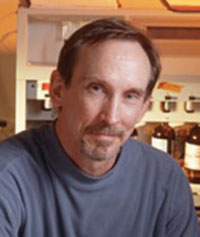
May 16, 2017
Mark Akeson
Sequencing DNA from Remote Villages to the Space Station: The Nanopore Revolution
Akeson is a professor of Biomolecular Engineering at UC Santa Cruz. He earned his B.A. in History from UC San Diego, and his Ph.D. in Soil Microbiology from UC Davis, then came to UCSC following a post-doctoral fellowship at the National Institutes of Health. Akeson is one of the pioneers of nanopore sequencing and leads the UC Santa Cruz nanopore group. The nanopore group has made important advances in nanopore sequencing technology by analyzing DNA molecules directly from the nucleus of eukaryotic cells. Nanopore technology brings modern genomics out of the lab and into the field—think Ebola or Zika outbreaks—with tremendous potential for human health.
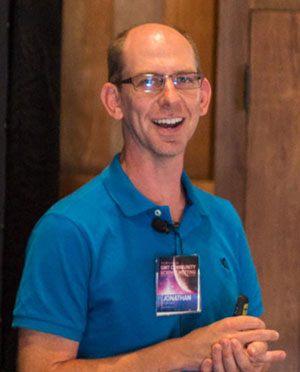
Mar 22, 2017
Jonathan Fortney
How Common is the Earth? The Discovery and Characterization of Rocky Planets Around Other Stars
Fortney is an astrophysicist who focuses on understanding the structure and composition of planets in our solar system and “exoplanets” around other stars. He has been involved with NASA’s Kepler spacecraft since its prime mission. He is also one of 15 principal investigators for a new NASA initiative, the Nexus for Exoplanet System Science (NExSS), which is a quest to find life on planets around other stars. Fortney is one of four new participating scientists NASA has chosen for the last phase of the Cassini Mission to Saturn, as the spacecraft dives between the planet’s rings and its atmosphere to collect unprecedented data.
Each lecture will be videotaped and archived here.
Questions? Contact UC Santa Cruz Special Events specialevents@ucsc.edu or (831) 459-5003.
Event Date:
Wednesday, March 13, 2024
5:30 p.m. - 7:00 p.m.
Locations:
3175 Bowers Ave, Santa Clara, CA 95054

